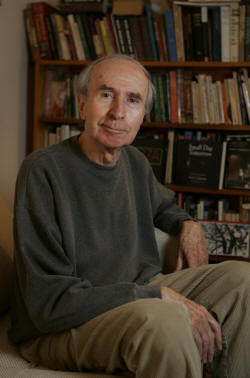

Queer Places:
Black Mountain College, Black Mountain, NC 28711
Columbia University (Ivy League), 116th St and Broadway, New York, NY 10027
193 N Franklin St, Nyack, NY 10960
Oak Hill Cemetery
Nyack, Rockland County, New York, USA
 Michael Rumaker (March 5, 1932 - June 3, 2019) was an American author best known for his semi-autobiographical novels that document his life as a gay man in the 1950s and after.[1]
He lived most of his life—from the early 1960s until 2018—in Nyack, New York.
Michael Rumaker (March 5, 1932 - June 3, 2019) was an American author best known for his semi-autobiographical novels that document his life as a gay man in the 1950s and after.[1]
He lived most of his life—from the early 1960s until 2018—in Nyack, New York.
Michael Rumaker was born in Philadelphia on March 5, 1932, to Michael Joseph and Winifred Marvel Rumaker. He had many siblings: George, William, Paul, David, Mary, Joseph, Robert, and John. Rumaker had 27 nieces and nephews, including Patrick, with whom he developed a special bond that began in 1984 when Patrick came out to his parents as a gay man and sought Michael’s wisdom and guidance.
After graduating from Woodbury High School in 1950, he studied journalism at Rider College in Trenton. In 1955, he graduated from Black Mountain College in Black Mountain, North Carolina, where he studied with the writers Charles Olson and Robert Creeley. Black Mountain Days is a memoir of his time at Black Mountain College. In addition, there are portraits of many students and faculty (including the poets Robert Creeley, Charles Olson and Jonathan Williams) from 1952 to 1956.
In the late 1950s, Michael’s short stories were published in literary magazines and were frequently anthologized. Between 1955 and 1957 he lived in San Francisco, where his writing began to be identified with Allen Ginsberg, Robert Duncan, and Laurence Ferlinghetti at the City Lights Bookstore. Rumaker entered the circle of Robert Duncan. His account of that time in the book Robert Duncan in San Francisco, first published by Donald Allen at his Grey Fox Press, gives an unvarnished look at the premier poet of the San Francisco Renaissance. Rumaker released previously unpublished letters between himself and Robert Duncan for a new edition, published by City Lights.
In 1958, after moving to New York City, Michael suffered an emotional breakdown. His fictionalized memoir, The Butterfly (published by Charles Scribner in 1962), is about that breakdown and about his affair with Yoko Ono, published before Ono became well-known. In 1967, Grove Press published his Gringos and Other Stories—realistic, short works of fiction about marginal characters living in America during the 1950s and 1960s. In 1969, he received a Master of Fine Arts in creative writing from Columbia University and began to teach in the English departments at Rockland Community College, the New School, and the City University of New York.
While living in Grand View and Nyack, New York in the 1970s, he wrote directly about his life as a gay man in books published by Donald Allen at Grey Fox Press in San Francisco: A Day and a Night at the Baths (1979) and My First Satyrnalia (1981). In the 1990s he wrote two novels: To Kill a Cardinal (1992)—which was inspired by the ACT-UP protest at St. Patrick’s Cathedral in New York City in 1989; and Pagan Days (1999)—set in South Philadelphia and National Park, called “Lenape” in the novel. Pagan Days is a stunning picture of poverty in the Great Depression, narrated by an 9-year-old boy, who, it seems clear, will grow up to be a gay man.
Michael’s nonfiction works include the memoirs Robert Duncan in San Francisco (1996, 2013)—which details the joys and predicaments of the city’s gay community in the 1950s and Michael’s relationships with Robert Duncan and various Beat writers; Black Mountain Days (2003)—about the last years of Black Mountain College—which includes portraits of the poets Robert Creeley, Charles Olson, and Jonathan Williams, and composer Merrill Gillespie during the years 1952 to 1956; and Pizza: Selected Poems (2005), published by Circumstantial Productions in Nyack. In all these writings, Michael made significant contributions, not just in literary methods but also in capturing the essence of his times. In speaking of A Day and a Night at the Baths, Michael said “my attempt in the writing was to shape a language commensurate with that emerging openness, a language vital, alive and cleansed of the language of the past that was all that we had had for so long: words of flesh-hatred and shame, language that shriveled the body and spirit.” Likewise, his poem “The Fairies Are Dancing All Over the World” caught the spirit of the 1960s, a kind of welcoming into the world of outsiders—the poor, the sick, and all who were perceived deviant. Michael’s papers, published works, and unpublished manuscripts are archived at the Thomas J. Dodd Research Center at the University of Connecticut.
Michael Rumaker was buried at Oak Hill Cemetery in Nyack, New York.
My published books: